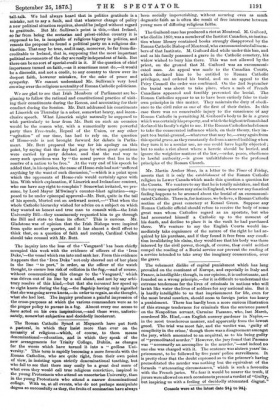The vehement dislike of capital punishment which has long prevailed
on the continent of Europe, and especially in Italy and France, is intelligible; though, in our opinion, it is unfortunate, and founded on a wrong principle,—for it is difficult to understand the extreme tenderness for the lives of criminals in nations who will lavish like water the lives of soldiers for any national aim. But it is hardly intelligible to us that imprisonment for life, even for the most brutal murders, should seem to foreign juries too heavy a punishment. There has hardly been a more curious illustration of this strange tenderness for criminals than the sentence passed on the Neapolitan servant, Carmine Paesano, who, last March, murdered Mr. Hind,—an English nursery gardener in Naples,— in the most treacherous manner, and apparently from the lowest greed. The trial was most fair, and the verdict was, ' guilty of complicity in the crime,' though there was a disagreement amongst the jury, which amounted to an acquittal, as to his being guilty of "premeditated murder." However, the jury found that Paesano was " necessarily an accomplice in the murder,"—and indeed no one else was charged with it. The sentence was sixteen years' im- prisonment, to be followed by five years' police surveillance. It is pretty clear that the doubt expressed as to the prisoner's having premeditated the murder was nothing but the equivalent of the formula "attenuating circumstances," which is such a favourite with the French juries. We fear it would be nearer the truth, if jurors were allowed on such occasions to present a verdict of "Guilty, but inspiring us with a feeling of decidedly attenuated disgust."






























 Previous page
Previous page